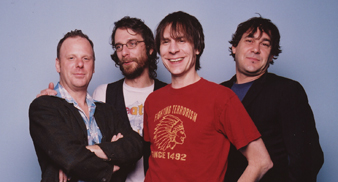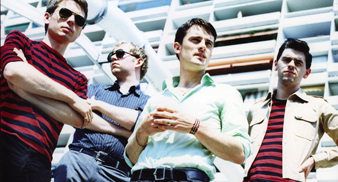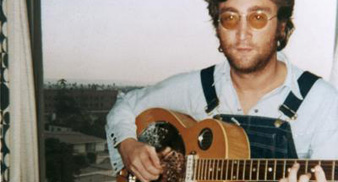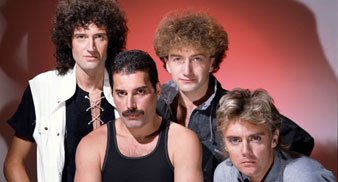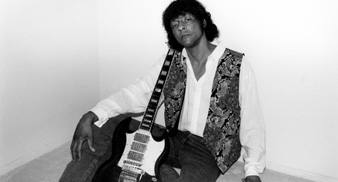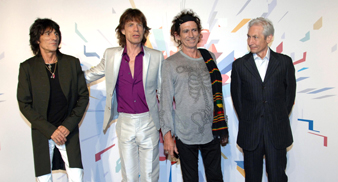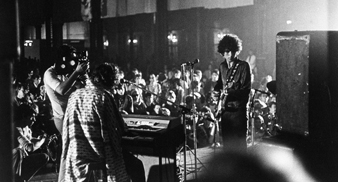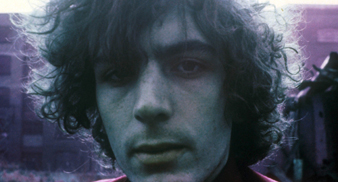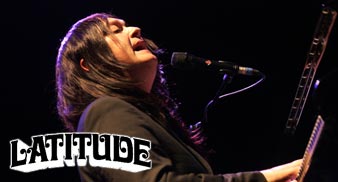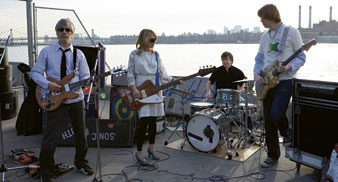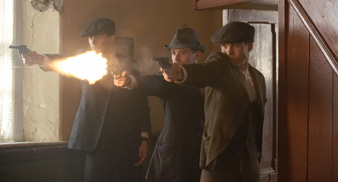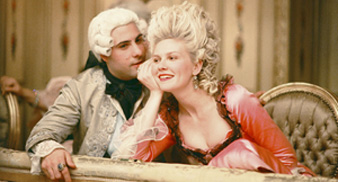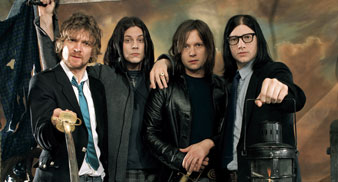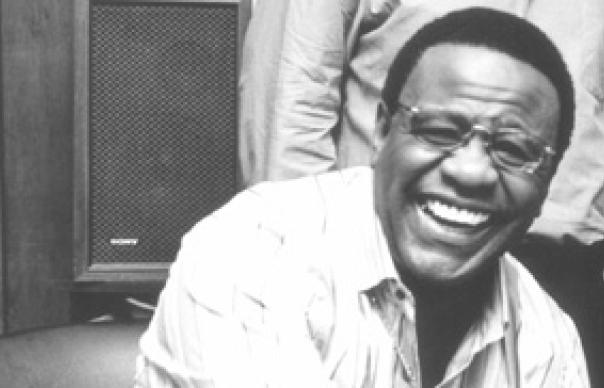Grunge is dirt. It is the scum that sticks to your bathtub. Grungey rock ‘n’ roll is dirty, salacious, raw and usually steeped in black humor. When Uncut asked me to compile my favorite songs of the Grunge Era I was a little stuck. I know it’s supposed to be the late 80s and early 90s, but there isn’t a whole lotta “grunge” in what is commonly thought of as the Grunge Era. Most of the big records of the time are clean and polished. The first grungey recordings coincide with the beginning of recorded music; King Oliver, Charley Patton, Jimmy Rodgers, and Ma Rainey have more grime, grit and sleaze than any of the major players of the 80s & 90s. With that in mind here, in roughly chronological order, are 20 of my favorite "grunge" rock songs: Captain Beefheart & His Magic Band - Diddy Wah Diddy Driven by a stomping fuzzed out bass, the Captain howls wolf-style, turning Bo Diddley’s easy going shuffle into a menacing beast. Sonics – He’s Waiting Slashed speakers blast a proto metal riff in the verse and a proto punk chorus. Who’s waiting for the girl who done screamer Gerry Roslie, wrong? Satan, of course. Stooges - Fun House Bass & drums lay down a relentless groove while guitar, sax and the Ig strafe the landscape. When Iggy tells the band to “bring it down” the hi-hat closes, that’s it, everything else continues full-on. This is what jazz-rock fusion could have been. Hawkwind - Master Of The Universe (Space Ritual version) Electronic sheets of sound, three fuzzed guitar chords, double-time proto-punk rock drumming, Lemmy’s distorto bass attack, duck-quack processed sax and solipsistic psychedelic paranoid lyrics make up this space grunge classic. The Mentally Ill - Gacy's Place Featuring a guitar so fried-out it barely exists and the charming chorus ”Fucking your kids, they1re fucking your kids now!” This is probably the grungiest record ever released. The b-sides, “Padded Cell” and “Tumor Boy” only add weight to my case. Cramps - I Can’t Find My Mind A slow, loping, thrusting superfuzz riff grinds away while Lux Interior drinks wine out of his pumps and dry humps the monitors in search of his brain. Black Flag - Life of Pain Despite its dangerous rep, most punk rock was pretty catchy and tuneful. Black Flag’s Greg Ginn wrote songs with tritones and other disharmonies. Life Of Pain is a great example of this, especially the intro and outro of the song. Black Flag grew their hair and pissed off the punks to no end. I couldn’t believe how easy it was to rattle these goofballs. It was like the reaction Dylan got when he plugged in, only WAY more violent. I immediately knew whose side I was on. I’m no purist. Flipper - Love Canal Nearly all Flipper songs are slow and feature a single simple bass riff and drum pattern while Ted Falconi splatters discordant indecipherable feedback-drenched guitar, Jackson Pollock-style, over the proceedings. It was a ground breaking formula that further divided the punkers. “Love Canal”, in the Pete Seger tradition of topical protest songs, deals with the upstate New York neighborhood built on a toxic dumpsite with sensitive lines like, ”we seem strange, our bodies all are breaking down...we are breeding, not to children but to monsters...we are dying, our common grave is the Love Canal.” The Scientists - When Fate Deals Its Mortal Blow A hip-shaking drum pattern, three note bassline that sounds like the Sliver Apples’ oscillator and slicing swampy guitars propel Kim Salmon’s tale of impending finality. Tales of Terror - Ozzy Sporting one of the coolest intro riffs ever, this song is both loose and hard driving. Their drummer owed more to Mitch Mitchell than any punk drummer and that’s what drove their twin guitar attack. The singer (Rat’s Ass) did backflips (when he wasn’t too drunk to stand) while the band got tangled up in guitar & mic cords. Sacramento’s Tales of Terror were stunning and hugely influential to a handful of kids in Seattle. Green River covered this song which has nothing to do with Ozzy the singer, but a “girl with the hair down to her toes” who makes Rat’s Ass’ “brain go down down down down and out.” They only released one album which is in dire need of reissue. Poison 13 - My Biggest Mistake Hyper unhinged blues-punk centered on Tim Kerr’s slashing slide guitar and Mike Carrol’s raw Texas drawl. The chorus of “My biggest mistake was when I left you” gets the M Night Shyamalan treatment with the final line of the song: “in a shallow grave.” Spacemen 3 - Losing Touch With My Mind In an era when the rest of the UK was in cahoots to foist lightweight fashion-pop on the rest of the world, a couple of kids in Rugby hunkered down with guitars, fuzz pedals, their favorite records (13th Floor Elevators, Stooges, MC5, VU, Suicide, JJ Cale, Staple Singers) and a big-ass pile of drugs. They staggered out of the bunker in 1986 clutching their first album Sound “f Confusion. “Losing Touch With My Mind” is the Eureka! moment that sets the whole thing off. Nirvana - Negative Creep Simple downstroke chugging with gaps filled by Iommiesque string bends and Kurdt screaming Œtill his eyes pop, vault Negative Creep to the top of the Kings of Grunge grungiest song pile. Drunks With Guns - Dick In One Hand “I got my dick in one hand and a rope in the other.” This song explored the subtleties of autoerotic asphyxiation, long before Michael Hutchence made it cool, by repeating the aforementioned line over two crunching chords until the whole thing stops, dead. Laughing Hyenas - Crawl This is a creeping world-gone-wrong song sung by the most intense man in showbiz, John Brannon (currently fronting Easy Action). Things seem dour enough during the verses, but when John hits the choruses his voice is the aural equivalent of a flamethrower. Draining, severe and purifying. Monster Magnet - Elephant Bell This little number comes complete with tribal stooge drumming, backwards big muff wah guitar and the line “my dick just got a million times bigger.” What more could you want? Kyuss - Asteroid Sub Pop founder Bruce Pavitt would often promote grunge as being “heavy and sexy.” Well, it doesn’t get any heavier & sexier than this instrumental from Welcome To Sky Valley. The song begins with a guitar that’s tuned so loose the strings sound like they might pop off the nut or slip off the bridge. Then, when the whole band kicks in, the groove gets canyon deep. The song ends with the band playing in tighter and faster concentric circles until the nut does indeed pop. Cheater Slicks - Ghost Most Velvets influenced outfits conveniently disregard the darkest and ugliest aspects of that band. The noise and abandon of “Sister Ray” lies at the heart of the Cheater Slicks. You can hear its influence in any of their songs, which don’t, by the way, strictly ape the Velvets. We at Mudhoney Inc were so stricken by this song that we covered it less than a year after it was released. Black Mountain - Druganaut (extended) The Meters’ groove gets pulled into Black Sabbath’s orbit trailing a haunting keyboard drone. Boy/girl vocal harmonies add to the song’s brilliance. The album version is great, but you can really lose yourself in the 8 minute extended mix. Comets On Fire - The Swallow’s Eye From their stunning new album Avatar comes this frenetic sprawling polymorphous attack that1s both mind and back bending. The Comets conjure Split, Space Ritual, After Bathing At Baxter’s and Population II via the smoke of punk. If you fail to get a charge from this you must be dead inside. -Mark Arm
Grunge is dirt. It is the scum that sticks to your bathtub. Grungey rock ‘n’ roll is dirty, salacious, raw and usually steeped in black humor. When Uncut asked me to compile my favorite songs of the Grunge Era I was a little stuck. I know it’s supposed to be the late 80s and early 90s, but there isn’t a whole lotta “grunge” in what is commonly thought of as the Grunge Era. Most of the big records of the time are clean and polished. The first grungey recordings coincide with the beginning of recorded music; King Oliver, Charley Patton, Jimmy Rodgers, and Ma Rainey have more grime, grit and sleaze than any of the major players of the 80s & 90s. With that in mind here, in roughly chronological order, are 20 of my favorite “grunge” rock songs:
Captain Beefheart & His Magic Band – Diddy Wah Diddy
Driven by a stomping fuzzed out bass, the Captain howls wolf-style, turning Bo Diddley’s easy going shuffle into a menacing beast.
Sonics – He’s Waiting
Slashed speakers blast a proto metal riff in the verse and a proto punk chorus. Who’s waiting for the girl who done screamer Gerry Roslie, wrong? Satan, of course.
Stooges – Fun House
Bass & drums lay down a relentless groove while guitar, sax and the Ig strafe the landscape. When Iggy tells the band to “bring it down” the hi-hat closes, that’s it, everything else continues full-on. This is what jazz-rock fusion could have been.
Hawkwind – Master Of The Universe (Space Ritual version)
Electronic sheets of sound, three fuzzed guitar chords, double-time proto-punk rock drumming, Lemmy’s distorto bass attack, duck-quack processed sax and solipsistic psychedelic paranoid lyrics make up this space grunge classic.
The Mentally Ill – Gacy’s Place
Featuring a guitar so fried-out it barely exists and the charming chorus ”Fucking your kids, they1re fucking your kids now!” This is probably the grungiest record ever released. The b-sides, “Padded Cell” and “Tumor Boy” only add weight to my case.
Cramps – I Can’t Find My Mind
A slow, loping, thrusting superfuzz riff grinds away while Lux Interior drinks wine out of his pumps and dry humps the monitors in search of his brain.
Black Flag – Life of Pain
Despite its dangerous rep, most punk rock was pretty catchy and tuneful. Black Flag’s Greg Ginn wrote songs with tritones and other disharmonies. Life Of Pain is a great example of this, especially the intro and outro of the song. Black Flag grew their hair and pissed off the punks to no end. I couldn’t believe how easy it was to rattle these goofballs. It was like the reaction Dylan got when he plugged in, only WAY more violent. I immediately knew whose side I was on. I’m no purist.
Flipper – Love Canal
Nearly all Flipper songs are slow and feature a single simple bass riff and drum pattern while Ted Falconi splatters discordant indecipherable feedback-drenched guitar, Jackson Pollock-style, over the proceedings. It was a ground breaking formula that further divided the punkers. “Love Canal”, in the Pete Seger tradition of topical protest songs, deals with the upstate New York neighborhood built on a toxic dumpsite with sensitive lines like, ”we seem strange, our bodies all are breaking down…we are breeding, not to children but to monsters…we are dying, our common grave is the Love Canal.”
The Scientists – When Fate Deals Its Mortal Blow
A hip-shaking drum pattern, three note bassline that sounds like the Sliver Apples’ oscillator and slicing swampy guitars propel Kim Salmon’s tale of impending finality.
Tales of Terror – Ozzy
Sporting one of the coolest intro riffs ever, this song is both loose and hard driving. Their drummer owed more to Mitch Mitchell than any punk drummer and that’s what drove their twin guitar attack. The singer (Rat’s Ass) did backflips (when he wasn’t too drunk to stand) while the band got tangled up in guitar & mic cords. Sacramento’s Tales of Terror were stunning and hugely influential to a handful of kids in Seattle. Green River covered this song which has nothing to do with Ozzy the singer, but a “girl with the hair down to her toes” who makes Rat’s Ass’ “brain go down down down down and out.” They only released one album which is in dire need of reissue.
Poison 13 – My Biggest Mistake
Hyper unhinged blues-punk centered on Tim Kerr’s slashing slide guitar and Mike Carrol’s raw Texas drawl. The chorus of “My biggest mistake was when I left you” gets the M Night Shyamalan treatment with the final line of the song: “in a shallow grave.”
Spacemen 3 – Losing Touch With My Mind
In an era when the rest of the UK was in cahoots to foist lightweight fashion-pop on the rest of the world, a couple of kids in Rugby hunkered down with guitars, fuzz pedals, their favorite records (13th Floor Elevators, Stooges, MC5, VU, Suicide, JJ Cale, Staple Singers) and a big-ass pile of drugs. They staggered out of the bunker in 1986 clutching their first album Sound “f Confusion. “Losing Touch With My Mind” is the Eureka! moment that sets the whole thing off.
Nirvana – Negative Creep
Simple downstroke chugging with gaps filled by Iommiesque string bends and Kurdt screaming Œtill his eyes pop, vault Negative Creep to the top of the Kings of Grunge grungiest song pile.
Drunks With Guns – Dick In One Hand
“I got my dick in one hand and a rope in the other.” This song explored the subtleties of autoerotic asphyxiation, long before Michael Hutchence made it cool, by repeating the aforementioned line over two crunching chords until the whole thing stops, dead.
Laughing Hyenas – Crawl
This is a creeping world-gone-wrong song sung by the most intense man in showbiz, John Brannon (currently fronting Easy Action). Things seem dour enough during the verses, but when John hits the choruses his voice is the aural equivalent of a flamethrower. Draining, severe and purifying.
Monster Magnet – Elephant Bell
This little number comes complete with tribal stooge drumming, backwards big muff wah guitar and the line “my dick just got a million times bigger.” What more could you want?
Kyuss – Asteroid
Sub Pop founder Bruce Pavitt would often promote grunge as being “heavy and sexy.” Well, it doesn’t get any heavier & sexier than this instrumental from Welcome To Sky Valley. The song begins with a guitar that’s tuned so loose the strings sound like they might pop off the nut or slip off the bridge. Then, when the whole band kicks in, the groove gets canyon deep. The song ends with the band playing in tighter and faster concentric circles until the nut does indeed pop.
Cheater Slicks – Ghost
Most Velvets influenced outfits conveniently disregard the darkest and ugliest aspects of that band. The noise and abandon of “Sister Ray” lies at the heart of the Cheater Slicks. You can hear its influence in any of their songs, which don’t, by the way, strictly ape the Velvets. We at Mudhoney Inc were so stricken by this song that we covered it less than a year after it was released.
Black Mountain – Druganaut (extended)
The Meters’ groove gets pulled into Black Sabbath’s orbit trailing a haunting keyboard drone. Boy/girl vocal harmonies add to the song’s brilliance. The album version is great, but you can really lose yourself in the 8 minute extended mix.
Comets On Fire – The Swallow’s Eye
From their stunning new album Avatar comes this frenetic sprawling polymorphous attack that1s both mind and back bending. The Comets conjure Split, Space Ritual, After Bathing At Baxter’s and Population II via the smoke of punk. If you fail to get a charge from this you must be dead inside.
-Mark Arm


